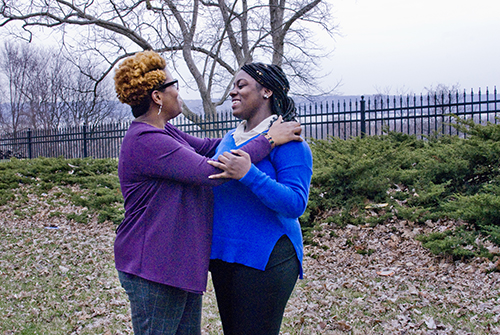
Yolanda Johnson, left, expresses support for her daughter Yunek Moore as the two discuss how Yunek was singled out and arrested. The two still wonder why the arrest ever took place. (PHOTO BY CLARE HOWARD)
Yunek Moore fulfilled every dream a parent could have. She was president of her class at Peoria High School, member of the National Honor Society, enrolled in after-school activities and was college bound.
Then, inexplicably, she was singled out at a backyard high school graduation party.
There were no drugs or alcohol at the party, but police had been called by a neighbor complaining about loud music. Yunek, one of the guests, was handcuffed and arrested by Peoria police, charged with resisting arrest and sent to Peoria County Jail.
She was 17 years old at the time. Her mother, Yolanda Johnson, drove to the jail to get her daughter.
Then Moore went on to college with a scholarship and to multiple surgeries for injuries she said she sustained in the arrest.
Moore is now a teacher at Peoria Charter School. Both she and her mother still don’t understand how that evening in 2013 unfolded and why Yunek was arrested.
“If you are charged with resisting arrest, what was the basis for the arrest in the first place?” her mother said recently.
Peoria attorney Jim LaFonte was equally baffled.
“I took this case because I really felt a lot was done wrong. It should never have happened. Yunek is not an average civil rights plaintiff. Yunek is the best of the best,” LaFonte said. “If this can happened to Yunek Moore, this can happen to anyone.
“What was the justification for arresting her? No statute or law was violated. Yunek did nothing wrong.”
Moore brought two unsuccessful cases against the city.
Peoria Police referred inquiries to the city. The Peoria spokeswoman said the city has a policy not to comment on litigation.
LaFonte said the first trial resulted in a hung jury with a young corporate attorney the sole holdout on the jury. LaFonte said that juror knew the police had no right to arrest Yunek.
Recounting the evening of the arrest, Yunek said someone shone a flashlight in her eyes and demanded her ID. She asked why. She thought someone was joking with her. The same demand was made again, and she responded the same way.
Others at the party that evening confirmed the police did not identify themselves.
LaFonte said initially it’s OK to refuse but later when you figure out it’s the police, you can assert your civil rights, but you can’t resist an unlawful arrest.
LaFonte said according to three witnesses, Yunek was yanked from her seat, dragged from the backyard with a twisted wrist technique and slammed into a garage wall.
LaFonte said the city contended Yunek’s surgeries were due to injuries sustained before the arrest, but Yunek, her mother and her high school coach dispute that.
“There were a lot of twists and turns in this case. I hope the city can take ownership of this,” LaFonte said.
This was not the split second, life and death decision often cited to explain police actions. LaFonte said in one of the trials, the jury was sent home on a Friday evening and over the weekend there was news coverage of a staged police demonstration portraying split second confrontations.
“That was an attempt to influence the jury. I’m 100 percent sure it was an attempt by the government to influence the decision of the jury,” LaFonte said. “This was not one of those split second, life or death decisions by police. Yunek never threatened police. It was police who escalated the situation.”
The jury returned after the weekend and was deadlocked.
LaFonte said he avoided publicity during the case because he felt without publicity, a settlement would be more likely. In mediation, the city offered less that $15,000 and half of Yunek’s legal expenses.
LaFonte said he sent a letter to the city offering to settle for $113,000, the cost of Yunek’s medical expenses. He said the city refused and opted to go to court.
“I live in Peoria. These are my tax dollars too,” LaFonte said. “We could have gotten the case settled for less than the cost of the second trial.”
For both mother and daughter, events of that spring evening six years ago are always in their consciousness.
Moore said it took her several years before she could talk about the experience. She was a freshman in college when Michael Brown was killed by police in Ferguson, Mo.
“I had felt like I was alone with this experience. People are afraid to talk about this kind of experience. But after Michael Brown, I started hearing about all these other stories,” she said. “We see institutional racism. We see how police are more aggressive” toward people of color.
Johnson said her daughter had an all-white jury, not a jury of her peers. Her daughter was on private property, not committing a crime and did not have to ID herself.
“The jury does not believe this happened. But when this happened to my wonderful daughter, it changed my perspective on law enforcement,” said Johnson, who works at Peoria AMT ambulance service. “I work with the police and consider them family. My daughter was bullied and intimidated and treated with armed force. They physically and mentally abused my 17-year-old daughter. They demeaned and disrespected her and were allowed to get away with it. This happens everyday to young Blacks, and then they say they don’t understand our anger.
“My consolation as a parent is at least they did not kill her.”

Recent Comments